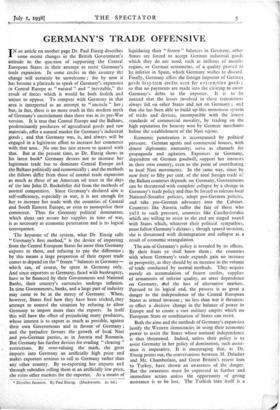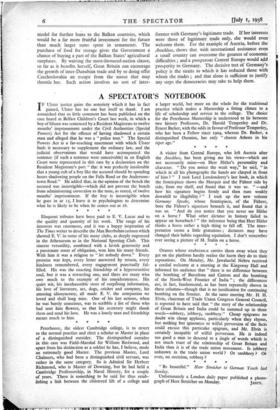GERMANY'S TRADE OFFENSIVE
TN an article on another page Dr. Paul Einzig describes some recent changes in the British Government's attitude to the question of supporting the Central European States in their attempt to resist Germany's trade expansion. In some circles in this country the change will certainly be unwelcome ; for by now it has become a platitude to speak of Germany's expansion in Central Europe as " natural " and " inevitable," the result of forces which it would be both foolish and unjust to oppose. To compete with Germany in that area is interpreted as an attempt to " encircle " her ; but, in fact, there is no more truth in this modern myth of Germany's encirclement than there was in its pre-War version. It is true that Central Europe and the Balkans, predominantly producers of agricultural goods and raw materials, offer a natural market for Germany's industrial goods ; and that Germany was, is, and always will be engaged in a legitimate effort to increase her commerce with that area. No one has just reason to quarrel with that. But at the present time, as Dr. Einzig shows in his latest book* Germany desires not to increase her legitimate trade but to dominate Central Europe and the Balkans politically and economically ; and the methods she follows differ from those of normal trade expansion as much as those of an American oil trust in the days of the late John D. Rockefeller did from the methods of normal competition. Since Germany's declared aim is self-sufficiency, especially in war, it is not enough for her to increase her trade with the countries of Central and South Eastern Europe, or even to monopolise their commerce. Thus for Germany political domination, which alone can assure her supplies in time of war, is as necessary as economic penetration and is its logical consequence.
The keystone of the system, what Dr. Einzig calls " Germany's first method," is the device of importing from the Central European States far more than Germany exports to them, and refusing to pay the difference ; by this means a large proportion of their export trade comes to depend on the " frozen " balances in Germany— which can,. of course, be spent in Germany only. And since exporters to Germany, faced with bankruptcy, have to be financed by their Governments and National Banks, . their country's currencies undergo inflation. In time Governments, banks, and a large part of induitry may come to be at the mercy of Germany. When, however, States find how they have been tricked, they attempt to control the situation by refusing to allow Germany to import more than she exports. In itself this will have the effect of prejudicing many producers, whose interest is to export as much as possible, against their own Governments and in favour of Germany ; 'and the prejudice favours the growth of local Nazi and pro-German parties, as in Austria, and Rumania. but Germany has further devices for evading " clearing " restrictions. By over-valuing the mark, she gives imports into Germany an artificially high price and makes exporters amcious to sell to Germany rather than any other country. By re-exporting her imports and IhroUgh subsidies selling them at an artificially low price, she ruins other markets for the exporter. As a means of * Bloodless Invasion. By Paul Einzig. (Duckworth. 2s. 6d.) liquidating their " frozen " balances in Germany, other States are forced to accept German industrial goods which they do not need, such as millions of mouth- organs, or German armaments, of a quality proved to be inferior in Spain, which Germany wishes to discard. Finally, Germany offers the foreign importer of German gonis load-term credits even for co a su-n?tion gods ; so that no payments are made into the clearing to cover Germany's debts to the exporter. It is to be noticed that the losses involved in these transactions always fall on other States and not on Germany ; and that she has been able to build up this monstrous system of tricks and devices, incompatible with the lowest standards of commercial morality, by trading on the high reputation for honesty won by German merchants before the establishment of the Nazi regime.
Economic penetration is accompanied by political pressure. German agents and commercial houses, with almost 'diplomatic immunity, serve as channels for propaganda and agitation. Exporters to Germany, dependent on German goodwill, support her interests in their own country, even to the point of contributing to local Nazi movements. In the same way, since by now forty to fifty per cent. of the total foreign trade of the Balkan countries depends on Germany, Governments can be threatened with complete collapse by a change in Germany's trade policy and thus be forced to tolerate local National-Socialist policies, adopt pro-German policies, and take pro-German advocates into the Cabinet. Countries like Austria suffer the fate of those who yield to such pressure, countries like Czechoslovakia which are willing to resist to the end are ringed round with States which, whatever their political sympathies, must follow Germany's dictates ; though spared invasion, she is threatened with disintegration and collapse as a result of economic strangulation.
. The aim of Germany's policy is revealed by its effects. By their fruits ye shall know them ; the countries with whom Germany's trade expands gain no increase in prosperity, as they should by an increase in the volume of trade conducted by normal methods. They acquire merely an accumulation of frozen credits, supplies of armaments of inferior quality, an utter dependence on Germany, aind the loss of alternative markets. . Pursued to its logical end, the process is as great a danger to the independence of the Central European States as armed invasion ; no less than war it threatens to effect a decisive change in the balance of power in Europe and to create a vast military empire which no European State or combination of States can resist.
Both the aims and the methods of Germany's expansion justify the Western democracies in using their economic power to assist the States whose national independence is thus threatened. Indeed, unless their policy is to assist Germany in her policy of domination, such assist- ance is imperative. It is encouraging that, as Dr. Einzig points out, the conversations between M. Daladier and Mr. Chamberlain, and Great Britain's recent loan to Turkey; have shown an awareness of the danger. But the awareness must be expressed in further and immediate action unless the opportunity of giving assistance is to be lost. The Turkish loan itself is a model for further loans to the Balkan countries, which would be a far more fruitful investment for the future than much larger sums spent in armaments. The purchase of food for storage gives the Government a chance of buying a part of the Balkan States' agricultural surpluses. By waiving the most-favoured-nation clause, so far as it benefits herself, Great Britain can encourage the growth of inter-Danubian trade and by so doing offer Czechoslovakia an escape from the noose that may throttle her. Such action involves no sort of inter- ference with Germany's legitimate trade. If her interests were those of legitimate trade only, she would even welcome them. For the exaMple of Austria, before the Anschluss, shows that with international assistance even a small country can overcome the greatest of economic difficulties ; and a prosperous Central Europe would add prosperity to Germany. The decisive test of Germany's policy is the straits to which it has reduced those with whom she trades ; and that alone is sufficient to justify any steps the democracies may take to help them.



















































 Previous page
Previous page